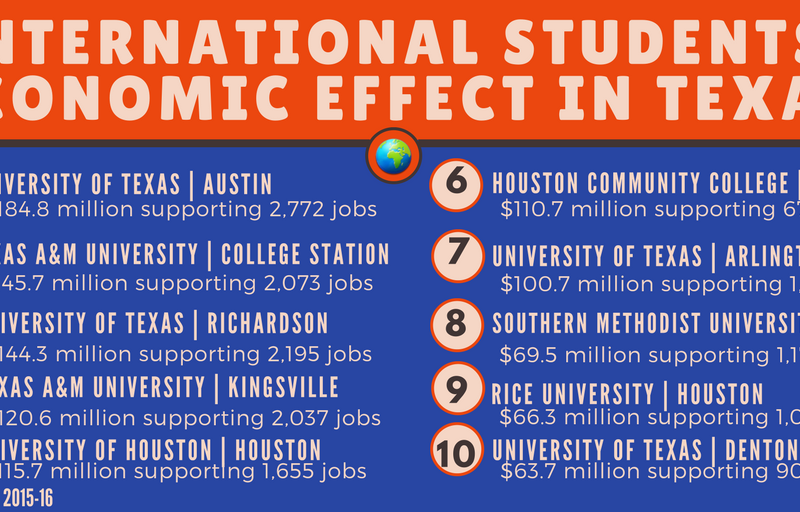Fewer Foreign Applicants Could Mean Fewer Jobs Around Texas Colleges
By Danielle Smith
Reporting Texas

Applications from international students to American universities are apparently falling. For Texas colleges, that means the prospect of less tuition revenue as they face declining support from the state and federal governments.
A November survey of members by the American Association of Collegiate Registrars and Admissions Officers found that 38 percent of 300 educational institutions saw a decline in international applications for fall 2017. Recruiters reported hearing widespread concern about President Donald Trump’s immigration policies. In the Middle East, 79 percent of potential applicants and their families said they worried about restrictive immigration rules.
“If our campuses and communities are to continue to benefit from both the academic and economic benefits these students bring, we must ensure that our government policies encourage them to choose the United States as their first choice for higher education,” said NAFSA Executive Director and CEO Marlene M. Johnson in a news release when the study was published.
Fewer foreign students would have an impact beyond tuition payments because of their contributions as workers, renters and consumers. According to a database maintained by the National Association of Foreign Student Affairs, 82,000 foreign students in Texas generated $1.9 billion in economic activity in the 2015-16 school year, supporting about 24,000 jobs.
UT-Austin benefited most among the 104 Texas colleges surveyed by NAFSA, with $184.8 million and about 2,800 jobs in 2015-16.
“You also have to talk about what they are paying in rent, food, and clothes. There’s a much broader economic impact as well,” said Teri Albrecht, director of international student and scholar services at the University of Texas at Austin in a telephone interview.
The prospect of less foreign tuition revenue comes as the state and federal governments consider cutting higher education support. The state Senate’s proposed budget for the next two years would cut higher education funding by $332.7 million, an average reduction of 7.9 percent per school. A House version would cut less by spending part of the state’s $12 billion “rainy day” fund. A conference committee is working to reconcile the two bills.
At the federal level, President Donald Trump’s proposed budget would eliminate up to $5.3 billion in student financial aid such as Pell Grants, according to American Progress, a Washington, D.C.-based think tank. Trump is also proposing deep cuts to the National Institutes of Health and other agencies that fund university research.
Margaret Luévano, associate director of international student and scholar services at UT-Austin, said in a telephone interview there’s more than money at stake if foreign students turn away from studying in the U.S.
“I think that international students are essential to the educational mission of the university because part of what we are trying to do is teach students to interact globally,” she said. “They get the world when they have international students in their classroom.”